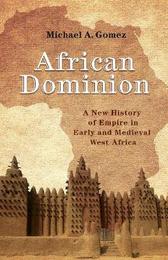
|
African Dominion: A New History of Empire in Early and Medieval West Africa
Hardback
Main Details
| Title |
African Dominion: A New History of Empire in Early and Medieval West Africa
|
| Authors and Contributors |
By (author) Michael Gomez
|
| Physical Properties |
| Format:Hardback | | Pages:520 | | Dimensions(mm): Height 235,Width 152 |
|
| Category/Genre | African history
Oral history |
|---|
| ISBN/Barcode |
9780691177427
|
| Classifications | Dewey:966.02 |
|---|
| Audience | | Tertiary Education (US: College) | | Professional & Vocational | |
|---|
| Illustrations |
8 Maps
|
|
Publishing Details |
| Publisher |
Princeton University Press
|
| Imprint |
Princeton University Press
|
| Publication Date |
1 January 2018 |
| Publication Country |
United States
|
Description
A groundbreaking history that puts early and medieval West Africa in a global context Pick up almost any book on early and medieval world history and empire, and where do you find West Africa? On the periphery. This pioneering book, the first on this period of the region's history in a generation, tells a different story. Interweaving political an
Author Biography
Michael A. Gomez is the Silver Professor of History and Middle Eastern and Islamic Studies at New York University. His books include Black Crescent: African Muslims in the Americas; Exchanging Our Country Marks: The Transformation of African Identities in the Colonial and Antebellum South; Reversing Sail: A History of the African Diaspora; and Pragmatism in the Age of Jihad: The Precolonial State of Bundu.
Reviews"Winner of the ASA Book Prize (Herskovits), African Studies Association" "Winner of the Martin A. Klein Prize, American Historical Association" "One of Choice Reviews' Outstanding Academic Titles of 2018" "[A] groundbreaking study of early and medieval West Africa." * New Yorker * "[A] richly researched new book."---Howard French, Times Literary Supplement "African Dominion is an excellent, readable book on a region often forgotten by medieval historians. Apart from his most obvious and important contributions to gender and global history in the African context, Gomez blazes a path for future pre-colonial historians."---Paul A. Ludi, Origins "Gomez deftly explores this complexity through the weaving of race, slavery, and identity in these empires, which were much more fluid than static. His work demonstrates not only the internal issues that caused both the rise and fall of these empires, but also their connections to North Africa and through that, to the larger Eurasian world."---T.M. Reese, Choice "Michael Gomez's survey of this long period more than updates the older synthesis, it revolutionizes it, transforms it, and will surely replace all that has come before it. Gomez's task is an arduous one, and it requires all of its 500 pages to perform. He carefully analyzes existing textual criticism, consulting original language versions, integrates the oral traditions, teases out all manner of stories and reconstructs borders and for all this, still creates a narrative. It is a signal achievement to do this, balancing much of the nuancing work between text and footnotes."---John Thornton, International Journal of African Historical Studies "This short review cannot do justice to the variety of insights African Dominion brings to our understanding of West African history. . . . I imagine that Michael Gomez's achievement will set the standard for scholarship on West Africa's empires for years to come."---Myles Osborne, Medieval Review "African Dominion shines new light on empire in early and medieval West Africa and is bound to stimulate new discussions on this pivotal period in this region's history."---Amir Syed, Islamic Africa "The material [Gomez] presents is immensely appealing. It overturns the ways that we think about things geographically. It leaves one astounded to discover that history could have been written for so long with such an unawareness of the sophistication of political thinking and political action in these areas. "---Hannah Skoda, FiveBooks "African Dominion offers valuable insight into the kinds of materials available for analysis of the region across a time period in excess of 600 years, and states the case for the study of regions and peoples ostensibly assigned to the periphery. This work is as insightful as it is extensive. . . . places West African history within the context of global flows of trade, gold and people, but also in terms of its exegesis of the philosophy of empires, and their constructions of ethnicity and lineage."---Joseph Da Costa, History: Journal of the Historical Association
|